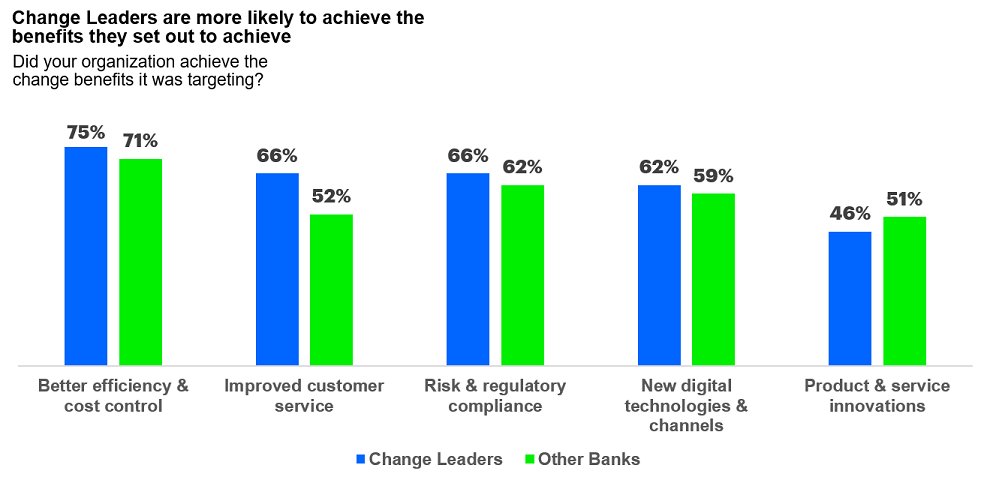Discover How Your Bank Can Become a Change Master

- Alan McIntyre, Senior Managing Director, Global Banking at Accenture
- 03.08.2017 09:45 am undisclosed , Alan McIntyre is Accenture's senior managing director for Banking. He is responsible for the industry group's overall vision and strategy, investment priorities, offering development and supporting network of alliance partners. Mr. McIntyre has more than 20 years of experience working with clients in the financial services industry. Before joining Accenture in 2016, Mr. McIntyre was a senior partner in the Financial Services practice at Oliver Wyman. Prior to that, he was Oliver Wyman's managing partner for North America, responsible for its consulting business in the United States, Canada and Mexico. From 2010 to 2012, he served as Oliver Wyman Group's chief operating officer. Mr. McIntyre has an M.A. in Philosophy and Economics from Glasgow University, a Masters of Philosophy in Finance from Pembroke College in Cambridge, England, and an MBA from IMD Business School in Lausanne, Switzerland. He has a passion for orchestral music, serving as chair of the Stamford Symphony in Stamford, Connecticut, and is on the board of the League of American Orchestras. He is involved in a number of educational and cultural organizations in his native Scotland—he is patron of The Institute of Contemporary Scotland and a monthly columnist for Scottish Review magazine. Mr. McIntyre is based in New York.
I’ve been a big Doctor Who fan since I first cowered behind my parents’ sofa in Scotland in the early 1970s, hiding from the Daleks. From the original black and white 1960s series to the recent news that, for the first time, the 13th Doctor will be a woman, the sci-fi series has continually reinvented itself to remain relevant to new audiences. One secret to its success has been the Doctor’s ability to regenerate into a completely new character every 2 to 3 years. Originally an elegant solution to the failing health of the first actor to play the role, regular regeneration has ensured that the writers have had the flexibility to take the show in different directions.
Read the report
If only it were that easy for banks to reinvent themselves! Instead of a flash of light and a miraculous rebirth, it’s becoming increasingly obvious that to win in the digital economy, banks not only need to have the right business strategy, they also need to master the discipline of continuously reinventing themselves. Instead of the change being a Doctor Who-like episodic and disruptive process, the ability to change and adapt needs to be part of the core DNA of the bank.
In Accenture’s recent 2017 Banking Change Survey, we asked more than 300 executives about their change priorities, how they embed change in their organisations, and the outcomes they are achieving. The study showed that those who have focused on change as a core capability—our ‘change leaders’—are seeing better results across a range of areas from cost control to customer service. The only category in which change leaders were not advantaged was product and service innovation, where it seems that too much change discipline may hinder spontaneity and creativity to some extent.

The leaders don’t treat change management as an ‘add on’ to other programs like network transformation or IT re-platforming. Instead, they view change management as a distinct discipline that not only ensures that they do the things they need to do, but also have the capacity to execute business strategies that will truly differentiate them. Cristoforo Avagliano, an executive at BNP Paribas, summed it up this way: “You have mandatory change because of regulation, you have change because of what competitors are doing, and then you have another kind of change: to catch the latest trends and what the customer is asking of you, but also what the customer has not asked for, but which you imagine. This is the change that can deliver the greatest economic benefit.”
Our survey revealed four key findings:
- Banks continue to increase their investment in change programs. Internal and external drivers are focusing these programs on cost control, improving the customer experience, digitisation and compliance.
- Our change leaders have a well-defined and well-communicated digital strategy, a clear and compelling vision of the changes that are needed, and greater leadership commitment to making those changes happen.
- Change leaders have a better understanding of the human factor and the role that a supportive culture can have in ensuring successful change.
- Change leaders have also invested in a well-staffed and professional change capability which, together with the other factors listed above, allows them to execute change with greater pace, discipline, and certainty of outcome.
More broadly, change leaders tell us that they have gotten comfortable with the need for rapid, non-stop transformation. While M&A or other disruptive events can occasionally create an opportunity for a Doctor Who-style radical regeneration, the reality for most banks is that superior performance requires them to master the less glamorous, but demonstrably vital process of continuous improvement.
This article originally appeared at: accenture.com



















